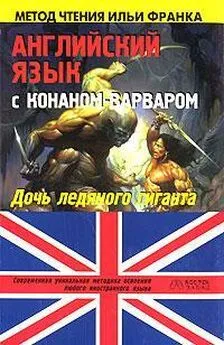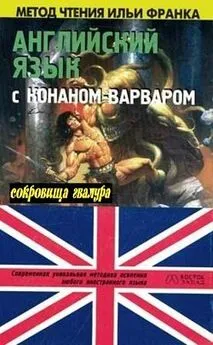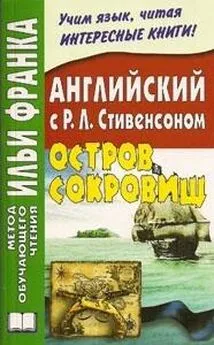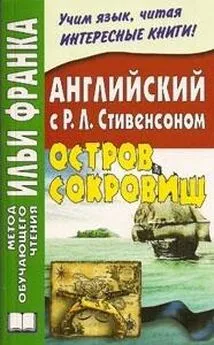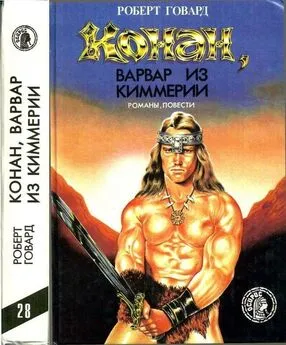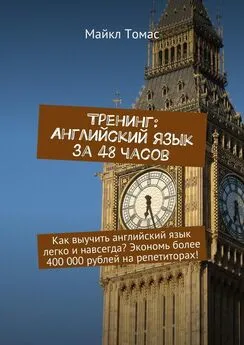Роберт Говард - Английский язык с Конаном-варваром
- Название:Английский язык с Конаном-варваром
- Автор:
- Жанр:
- Издательство:АСТ, Восток-Запад
- Год:2007
- Город:Москва
- ISBN:5-17-042032-3, 5-478-00503-7
- Рейтинг:
- Избранное:Добавить в избранное
-
Отзывы:
-
Ваша оценка:
Роберт Говард - Английский язык с Конаном-варваром краткое содержание
В книге предлагается произведения Роберта Е. Говарда, адаптированные (без упрощения текста оригинала) по методу Ильи Франка. Уникальность метода заключается в том, что запоминание слов и выражений происходит за счет их повторяемости, без заучивания и необходимости использовать словарь. Пособие способствует эффективному освоению языка, может служить дополнением к учебной программе. Предназначено для студентов, для изучающих английский язык самостоятельно, а также для всех интересующихся английской культурой.
Метод чтения Ильи Франка
Содержание:
Дочь ледяного великана
Проклятие монолита
Замок ужаса
За Черной рекой
Тени Замбулы
Английский язык с Конаном-варваром - читать онлайн бесплатно полную версию (весь текст целиком)
Интервал:
Закладка:
python [ˈpaɪƟən], loon [lu: n], magic [ˈmæʤɪk]
"He was," answered Conan. "Like the other four; each one, when his time came, went mad and rushed into the woods to meet his death like a hare running down the throat of a python. Something called to them from the deeps of the forest, something the men call a loon, for lack of a better name, but only the doomed ones could hear it. Zogar Sag has made a magic that Aquilonian civilization can't overcome."
To this thrust Valannus made no reply; he wiped his brow with a shaky hand (на этот выпад Валаннус не дал ответа, он вытер /свой/ лоб дрожащей рукой; to shake — встряхивать; дрожать ).
"Do the soldiers know of this (солдаты знают об этом)?"
"We left the body by the eastern gate (мы оставили тело у восточных ворот)." "You should have concealed the fact, hidden the corpse somewhere in the woods (тебе следовало скрыть факт, спрятав труп где-нибудь в лесу). The soldiers are nervous enough already (солдаты уже /и так/ достаточно нервничают; to be nervous — нервничать )."
"They'd have found it out some way (/они/ узнали бы /об/ этом так или иначе; to find out — выяснить, узнать; would have + причастие прошедшего времени — условное наклонение — сделал бы ). If I'd hidden the body, it would have been returned to the fort as the corpse of Soractus was — tied up outside the gate for the men to find in the morning (если бы я спрятал тело, оно бы вернулось в форт, как труп Сорактуса /было/ — привязанным за воротами, /чтобы/ люди = солдаты нашли его утром)."
conceal [kənˈsi: l], already [ɔ: lˈredɪ], men [men]
To this thrust Valannus made no reply; he wiped his brow with a shaky hand. "Do the soldiers know of this?"
"We left the body by the eastern gate."
"You should have concealed the fact, hidden the corpse somewhere in the woods. The soldiers are nervous enough already."
"They'd have found it out some way. If I'd hidden the body, it would have been returned to the fort as the corpse of Soractus was — tied up outside the gate for the men to find in the morning."
Valannus shuddered (Валаннус содрогнулся). Turning, he walked to a casement and stared silently out over the river, black and shiny under the glint of the stars (повернувшись, он прошел к окну и посмотрел молча за реку, черную и блестящую под сверканием звезд). Beyond the river the jungle rose like an ebony wall (за рекой высились дебри, как черная стена). The distant screech of a panther broke the stillness (далекий хрип пантеры нарушил тишину). The night pressed in, blurring the sounds of the soldiers outside the blockhouse, dimming the fires (ночь втиснулась = повисла , размывая звуки солдат снаружи /перед/ блокгаузом, затемняя костры; to blur — размывать, делать мутным / неясным ). A wind whispered through the black branches, rippling the dusky water (ветер шептал через черные ветви, покрывая рябью темную воду). On its wings came a low, rhythmic pulsing, sinister as the pad of a leopard's foot (на его крыльях донеслось низкое ритмичное биение, зловещее, как подушечка /на/ лапе леопарда).
glint [ɡlɪnt], press [pres], pad [pæd]
Valannus shuddered. Turning, he walked to a casement and stared silently out over the river, black and shiny under the glint of the stars. Beyond the river the jungle rose like an ebony wall. The distant screech of a panther broke the stillness. The night pressed in, blurring the sounds of the soldiers outside the blockhouse, dimming the fires. A wind whispered through the black branches, rippling the dusky water. On its wings came a low, rhythmic pulsing, sinister as the pad of a leopard's foot.
"After all," said Valannus, as if speaking his thoughts aloud, "what do we know — what does anyone know — of the things that jungle may hide (в конце концов, — сказал Валаннус, как будто высказывая свои мысли вслух, — что мы знаем — что знает кто-нибудь — о вещах = о том , что может скрывать чаща)? We have dim rumors of great swamps and rivers (мы имеем = у нас есть смутные слухи о великих болотах и реках), and a forest that stretches on and on over everlasting plains and hills to end at last on the shores of the western ocean (и лесе, который простирается дальше и дальше через бесконечные равнины и холмы, /чтобы/ закончиться наконец на берегах западного океана). But what things lie between this river and that ocean we dare not even guess (но какие вещи = что лежит между этой рекой и тем океаном, мы не осмеливаемся даже гадать). No white man has ever plunged deep into that fastness and returned alive to tell us what be found (ни один белый человек никогда /не/ погружался глубоко в эту твердыню и /не/ возвращался, /чтобы/ рассказать нам, что нашел; fastness — крепость, оплот, твердыня, цитадель; fast — крепкий, твердый ). We are wise in our civilized knowledge, but our knowledge extends just so far — to the western bank of that ancient river (мы мудры нашим цивилизованным знанием, но наше знание простирается пока лишь до западного берега древней реки)! Who knows what shapes earthly and unearthly may lurk beyond the dim circle of light our knowledge has cast (кто знает, какие формы земные и неземные могут таиться за неясным кругом света, /которое/ отбрасывает наше знание; to cast — бросать, отбрасывать )?
aloud [əˈlaud], we [wi: ], shore [ʃɔ:]
"After all," said Valannus, as if speaking his thoughts aloud, "what do we know — what does anyone know — of the things that jungle may hide? We have dim rumors of great swamps and rivers, and a forest that stretches on and on over everlasting plains and hills to end at last on the shores of the western ocean. But what things lie between this river and that ocean we dare not even guess. No white man has ever plunged deep into that fastness and returned alive to tell us what be found. We are wise in our civilized knowledge, but our knowledge extends just so far — to the western bank of that ancient river! Who knows what shapes earthly and unearthly may lurk beyond the dim circle of light our knowledge has cast?
"Who knows what gods are worshipped under the shadows of that heathen forest (кто знает, каким богам поклоняются под сенью того языческого леса), or what devils crawl out of the black ooze of the swamps (или какие демоны выползают из черной грязи болот)? Who can be sure that all the inhabitants of that black country are natural (кто может быть уверен, что все жители той черной страны естественные)? [33] Имеют естественное происхождение.
Zogar Sag — a sage of the eastern cities would sneer at his primitive magic-making as the mummery of a fakir (Зогар Саг — мудрец восточных городов глумился бы над его примитивным волшебством, как над представлением факира; mummery — рождественская пантомима; маскарад ); yet he has driven mad and killed five men in a manner no man can explain (тем не менее он свел с ума и убил пять человек способом, /который/ ни один человек /не/ может объяснить; to drive mad — свести с ума ). I wonder if he himself is wholly human (я желаю знать / интересно, он сам является /ли/ полностью человеком = совсем ли человек он сам )."
ooze [u: z], sage [seɪʤ], sneer [snɪə]
"Who knows what gods are worshipped under the shadows of that heathen forest, or what devils crawl out of the black ooze of the swamps? Who can be sure that all the inhabitants of that black country are natural? Zogar Sag — a sage of the eastern cities would sneer at his primitive magic-making as the mummery of a fakir; yet he has driven mad and killed five men in a manner no man can explain. I wonder if he himself is wholly human."
"If I can get within ax-throwing distance of him I'll settle that question," growled Conan (если я смогу добраться на расстояние броска топора от него, я улажу / решу этот вопрос, — прорычал Конан), helping himself to the governor's wine and pushing a glass toward Balthus (угощаясь: «помогая себе к» губернаторским вином и подталкивая стакан к Балтусу), who took it hesitatingly, and with an uncertain glance toward Valannus (который взял его, колеблясь и с неуверенным взглядом на Валаннуса).
The governor turned toward Conan and stared at him thoughtfully (губернатор повернулся к Конану и уставился на него задумчиво).
"If I can get within ax-throwing distance of him I'll settle that question," growled Conan, helping himself to the governor's wine and pushing a glass toward Balthus, who took it hesitatingly, and with an uncertain glance toward Valannus.
The governor turned toward Conan and stared at him thoughtfully.
"The soldiers, who do not believe in ghosts or devils," he said, "are almost in a panic of fear (солдаты, которые не верят в привидения и демонов, — сказал он, — почти в панике от страха). You, who believe in ghosts, ghouls, goblins (ты, который веришь в привидения, вампиров, гоблинов), and all manner of uncanny things (и всякого рода сверхъестественных существ; uncanny — сверхъестественный, необъяснимый, поразительный; жуткий ), do not seem to fear any of the things in which you believe (не кажешься бояться = кажется, не боишься ничего из того: «какую-либо из вещей», во что ты веришь)."
who [hu: ], fear [fɪə], believe [bɪˈli: v]
"The soldiers, who do not believe in ghosts or devils," he said, "are almost in a panic of fear. You, who believe in ghosts, ghouls, goblins, and all manner of uncanny things, do not seem to fear any of the things in which you believe."
Читать дальшеИнтервал:
Закладка:
